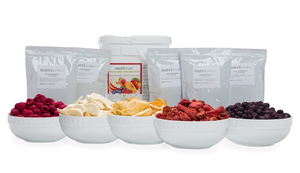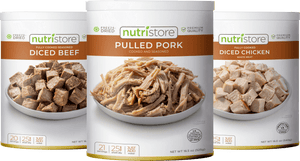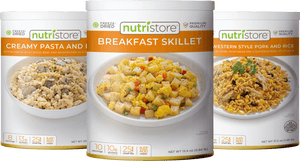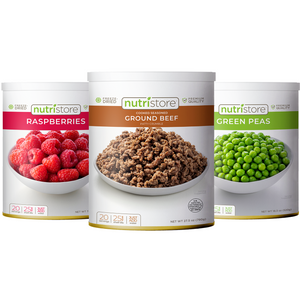Best Ways to Prepare for Hurricane Season
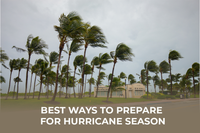
Did you know that rates of hurricanes in the U.S. are going up? It is important that you and your family are prepared for what’s to come. We have the information you need to feel confident and prepared for any emergency during hurricane season.
*2020 and 2021 were the 2nd and 3rd Highest Years for Hurricanes on Record
In the North Atlantic Basin, the average number of tropical storms per year from 1966-2009 was 11. From 2000-2014, however, it was 15 per year. (1) What has happened since then?
According to the National Oceanic and Atmospheric Administration:
“In total, the 2020 season produced 30 named storms (top winds of 39 mph or greater), of which 14 became hurricanes (top winds of 74 mph or greater), including seven major hurricanes (top winds of 111 mph or greater). This is the most storms on record, surpassing the 28 from 2005, and the second-highest number of hurricanes on record.” (NOAA) (2)
That’s right. The year 2020 saw 30 tropical storms, nearly 3x the average from 1966 to 2009. Between the increasing rates of hurricanes and troubling economic times, we need to be prepared for any emergency.
Our purpose in mentioning this is not to increase fear or worry, but simply to bring attention to our current circumstances and then to empower you to prepare. We believe it is crucial to focus on what we can control, never on what we can’t.
Hurricane Risk Zones
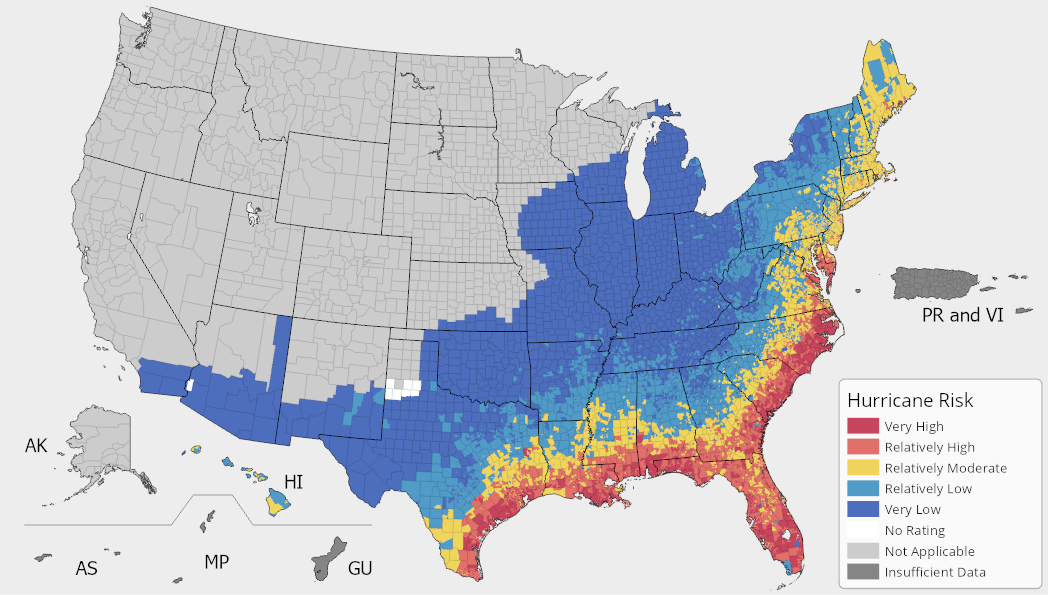
*https://hazards.fema.gov/nri/hurricane
How to Prepare for a Hurricane
Hurricane season is June 1st through November 30th. If you live in a danger zone, it’s time to start preparing. Let’s go over what steps you need to take to prepare your home and your family for this potential emergency.
Steps to Prepare Your Home for a Hurricane
Hurricane winds can range from 74 mph to 156 mph (and even more on rare occasions). Winds of these speeds, as you know, can do very serious damage to your home. There’s also flooding to deal with. Reinforcing your home and taking other precautions can make a big difference. Here are a few tips for prepping your home for a hurricane:
- Windows: Make sure your windows have a DP (Design Pressure) rating. If they are not resistant to impact, then you can install hurricane shutters. Once you have the initial pieces installed, hurricane shutters can be easily installed and removed as needed.
- Garage door: Install a wind-rated garage door. These can be pricey, but they’re worth it. If you prefer to DIY it, you can install a custom brace for your garage door instead.
- Seal windows: Ensure that your windows are properly sealed and will not allow water in. You can re-caulk your windows if they need a fresh coat. An added bonus is that doing these things will also save you on your HVAC bill each month!
- Seal doors: Ensure the weather stripping around your door is prepped and ready to go. If not, install new weather stripping around your door. Weather stripping is very simple to remove and replace. Simply use pliers to grip the top of the stripping, pull it out, and then pull the rest out by hand. Then, simply cut new stripping to size and press it in by hand.
- Secure the roof: The roofs of many homes rely on gravity more than anything to keep them in place. During 130 mph winds, this likely won’t be sufficient. You can install your own metal straps on the roof, which will go a long way towards securing your home.
Supplies to Prepare Your Family for a Hurricane
When it comes to Hurricane prep, having the right supplies and a proper plan are key. Take time to communicate with your children about safety during a hurricane and have a gameplan for what you will do in the event of one. We’ll talk more about this further on.
Here are the supplies you’ll want to have on hand if a hurricane strikes:
- Freeze dried/non-perishable food
- Flashlight with extra batteries
- Water (at least one gallon per person per day)
- First aid kit
- Medications
- Whistle (to signal others)
- Wrench or pliers (to turn power off during a storm - prevents damage to circuits)
- Manual can-opener
- Local maps
How to Find Out if a Hurricane is Coming
You can stay updated on the weather and hurricane warnings through your local news or radio stations. You can also use apps such as Storm Radar or Hurricane by the American Red Cross to track hurricane activity.
What to Do in a Hurricane
How do you protect yourself and your family during a hurricane? Here are several important guidelines to follow:
- Ensure that your windows and doors are shut and locked
- Keep your 72-hour kits on hand in case you need to leave in a rush
- Even if it looks safe outside, stay indoors. If you go outside, you could get hit by debris
- Stay away from windows
- Stay updated: listen to the radio, TV, or use a hurricane tracking app
- Turn off main energy sources to prevent electrical surges or damage
- Beware of water coming into your home and take action if necessary
Where Can I Get Emergency Prep Supplies?
Nutristore carries wide variety freeze dried foods that last 25 years, so you’ll be prepared for any emergency. We provide you with peace of mind and the knowledge that you have what your family needs during something as big as a hurricane, or as small as missing an ingredient for dinner. Check out all bulk survival and preparedness kits to start building your survival emergency food supply!
Sources:
- Hurricanes and Climate Change. Center for Climate & Energy Solutions. https://www.c2es.org/content/hurricanes-and-climate-change/#:~:text=Frequency%20and%20intensity%20vary%20from,year%2C%20including%20about%20seven%20hurricanes.
- Record Breaking Atlantic Hurricane Season Draws to an End. National Oceanic and Atmospheric Administration. https://www.noaa.gov/media-release/record-breaking-atlantic-hurricane-season-draws-to-end
Comments (3)
Thank you, Travis, for this comprehensive guide on hurricane preparedness. The statistics you’ve shared highlight the urgency for families to take action, especially given the increasing frequency of hurricanes. I appreciate the practical steps you’ve outlined for securing homes and gathering essential supplies. The emphasis on empowering families to feel in control during such emergencies is particularly important. Your recommendations for reinforcing windows and securing roofs are not only smart but also actionable for homeowners.
Additionally, the list of supplies, including non-perishable foods and tools for emergency situations, is invaluable. Using apps to stay updated on hurricane activity is a great touch, ensuring that everyone remains informed. This article is a crucial resource for anyone living in hurricane-prone areas. Let’s all take these steps seriously to protect our homes and loved ones. Stay safe!
Travis, thank you for sharing this crucial information on preparing for hurricane season. The statistics on the increasing frequency of hurricanes in recent years are indeed alarming, making preparation more vital than ever. Your focus on empowerment and control in the face of potential emergencies is a refreshing perspective. The breakdown of steps to prepare both the home and family is incredibly practical. Your advice on reinforcing windows, installing wind-rated garage doors, and securing roofs adds a tangible aspect to the preparation process. Moreover, the list of supplies, from non-perishable food to a wrench for turning off power during a storm, is comprehensive and ensures readers are well-equipped. The inclusion of apps for tracking hurricane activity is a helpful tip in staying informed. Overall, your article serves as a valuable guide for individuals and families in hurricane-prone areas, and the emphasis on preparedness is commendable. Stay safe and thank you for contributing to community resilience.
Best Regards,
Joe E. Eells
Castle Impact Windows
https://www.castleimpactwindows.com/
What is the best way to break down a bucket? I would like to use and then replace some of the foods, but there is only two of us, so how could I store the rest of the can and use small amounts for home use. I have a machine that takes oxygen out of canning jars, might this work to break down a can into small amts?
Leave a Comment
You May Also Like

The Nutritional Health Benefits of Freeze-Dried - Is it Good for You?
What you put in your body matters, everyone knows this! That is why it is crucial to understand the nutritional benefits of freeze-dried food and if it is good for your family.

How Long Freeze Dried Food Really Lasts & The 4 Threats to Shelf Life
Ever wondered how long freeze dried food lasts before and after it is opened? Understanding these 4 shelf life factors will give you more peace of mind in storing your products.

